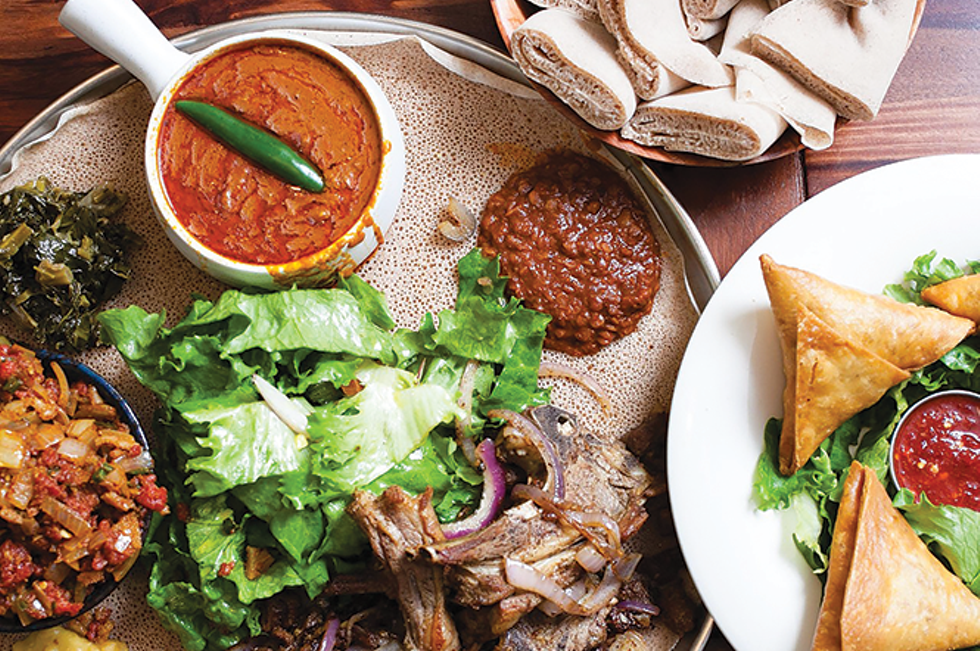Year
Right around Thanksgiving 2019, food Twitter users posted controversial food takes aplenty. It's all good and well to come clean about how you can't eat anything unless it's battered and deep-fried, but it didn't take long before these food takes devolved into a mass of bickering that skirted the boundaries of casual racism. Amid this digital melee, food writer Peter Meehan threw out an interesting contribution: Instead of further stirring the pot, he suggested that those who participated in the thread spend 2020 making an effort to better understand opposing hot takes. I thought this suggestion carried a certain wisdom, and I have been thinking about since. Food is a cultural microcosm, and taking the time to understand the food that freaks us out or baffles us by existing is a low-stakes—and potentially tasty—way to relate to other cultures, mindsets and opinions.
It's a tricky endeavor to explore the foods that have challenged us. Our eating habits form very early on in life, and making an attempt to better understand those habits can require some psychological excavating. That said, I think it's important to differentiate between liking a certain food and respecting a certain food—that's the relationship we want to forge. Since I'm perpetuating Meehan's 2020 food challenge, I think it's only fair to jump into the foods, trends and cultures that I'm hoping to better understand this year.
Plant-Based Meat
I've never really seen myself going all in with a vegan lifestyle, but the proliferation of plant-based meat alternatives has me revisiting this dialog. Maybe this is a cynical point of view, but when the fast-food machine starts to embrace meat substitutes, you have to think that a sea change is coming. I'm not suggesting that fast-food joints are good barometers for measuring eating habits, but I know enough about fast-food capitalism to see that they wouldn't adopt this practice if it didn't make money. It means that people interested in meat substitutes make up a large enough market for fast-food conglomerates to take notice.
Having tried the Impossible Whopper and other fast-food iterations of plant-based meat, I have to say that this can only be a good thing. When I do get a hankering for a fast-food burger and I see that they're offering the meatless substitute, that's what I get. It tastes and costs pretty much the same, so why not create a financial incentive for these corporations to invest in an alternative that is cleaner, (arguably) healthier and better for the environment?
Having recently read about the USDA's decision to roll back some federal restrictions on factory slaughterhouses, adopting a more plant-based attitude in 2020 is something that I'm starting to take more seriously.
Outside of the fast food chains, Salt Lake has some spectacular plant-based restaurants that make the transition easy—Seasons Bistro (1370 S. State, 385-267-1922, seasonsslc.com) and Boltcutter (57 E. Gallivan Ave., facebook.com/boltcutter) are among the very finest.
African Food
After visiting restaurants like the pictured Mahider Ethiopian (1465 S. State, 801-975-1111, mahiderethiopian.com) and Horn of Africa (1320 S. Swaner Road, 801-908-5498, facebook.com/hornofafricabistro), it became woefully clear that I have not been exposed to nearly enough food from African countries. Even though Ethiopia and Somalia share a border, the differences between these two restaurants are staggering. I can only assume that a deeper dive into African cuisine can yield positive and delicious results.
Based on my few experiences with eating local African food, it strikes me as a cuisine that showcases the vibrant and conflict-ridden history that exists within this continent. As food is one of my favorite ways to experience a new culture, I'd like to spend some more time this year wrapping my head around food from this part of the world.
Local Farming
Concepts like "locally sourced" and "sustainable" have become major buzzwords in the restaurant industry, and it feels like we're seeing the relationship between local chefs and growers strengthen. I can only think of the positive impact that this relationship has on our local economy, but it soon occurred to me that this is because I'm approaching it from a consumer standpoint. I'd like to spend some time in 2020 getting to know more about our local growers and seeing this uptick in popularity from their perspective.
As many of these local farms host volunteer opportunities and classes, I figure 2020 will be a good year to see what makes them tick—I'm sure I can talk my 3-year-old daughter into coming along with me as well.
I'm hoping that making a game plan to better understand the way we eat locally will not only help me find new and exciting things to eat, but that it will help me turn this experimental view to other elements of the world. If I have a positive experience getting to know a heretofore misunderstood food, maybe I'll have a similar experience by setting my cultural sights on something else. Either way, 2020 will be the year that I test this hypothesis—I'll let you know how it goes.
Fermentation, spice and ... burger-flavored ice cream?
Weekly contributors dish on what food trends they're looking forward to in 2020.
A video showing "how to turn a Whopper into a delicious ice cream" recently popped up on my Facebook feed, and I was simultaneously revolted and intrigued. In it, the burger—onions and all—is surgically chopped, doused with condensed milk and turned into a delectable rolled treat. "A delicious," indeed. So, I'd say more of that in 2020. Hot 'n Spicy McChicken macarons, perhaps?
Fermentation: This year I want to dive into the world of cultures ... which is to say I want to ferment veggies, age vegan nut-based cheeses with real molds and probiotics (it's a thing) and make tasty fermented drinks like tepache, which is fermented pineapple juice. Hopefully I can culture myself to the point of coming up with my very own recipes.
Since becoming a vegetarian almost a year ago, I've noticed the lack of diverse flavors in my palate. In 2020, I'll venture to overcome my irrational fear of spice—a stereotypical caucasian, I am. Soon you'll see me chowing down on some super hot dishes. For now, I'll be starting with Sriracha.
I want to get to know more about the varieties of Latin American cuisine. This includes checking out more culinary treasures in Salt Lake City's westside communities and branching out of the Americanized tacos, burritos, etc. Having goat meat for the first time this year was great; here's to finding another gem as scrumptious as that.
I need a little culinary magic this year. And what better way than a foray into the world of plant-based foods? I'm told the pros—and home cooks, too—practice 21st century kitchen alchemy by transforming jackfruit into chicken and seitan into sausage. Cool. City Weekly and Devour tell me, too, the Wasatch Front abounds with four-star plant based eateries, and I'd like to try a few. Ditto with dessert shops offering non-dairy delicacies. Pappardelle Stroganoff at Seasons, and Salted Date soft serve at Normal are just a couple of my must-tries in 2020.







